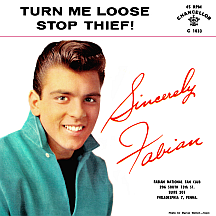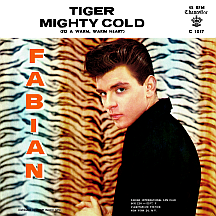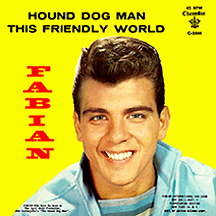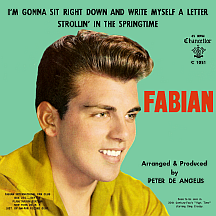FABIAN
Here's a question you might not have heard in awhile (if ever): is Fabian underrated? Indulge me on this topic for a moment. Many music critics since the late 1950s have been less than complimentary when it comes to his vocal sound. Yet there were impressive numbers of teenage girls during his '59 breakout who would have given him a big thumbs-up. Fabian, well aware of the lack of support from "professionals," was mainly concerned about the fans (their approval comes with hard, cold cash, after all). It turned out his recording career lasted only a few years...yet the surrounding mania led to an opportunity to act in films and on television, a profession that kept him working steadily for a few decades. Some onscreen performances were quite good, even.
Fabian Anthony Forte was born in 1943 and grew up in Philadelphia, home of other "teen idol" singers (Frankie Avalon, Jimmy Darren, Bobby Rydell) who rose to fame at about the same time. His father, police officer Domenic Forte, had a heart attack and later died (Fabian's grandfather, Fabiano Forte, actually outived his son); on the day an ambulance took his dad away, he was spotted in front of his home by Bob Marcucci, the head of Chancellor Records in Philly, who had no idea whether the 14-year-old could sing, and didn't care; his looks (not unlike a younger Elvis) made him a candidate for teen idol stardom. An offer was made and Fabian accepted, figuring he had nothing to lose. After taking voice lessons and having his hair styled in a pompadour, he cut his first single, "I'm in Love," with staff producer (and Chancellor co-owner) Peter DeAngelis. The record exposed his voice as something less than ideal and very few stations played the disc despite a June 1958 appearance on American Bandstand, broadcast nationwide from his hometown. Deejays in Buffalo, New York supported this debut effort; it was a minor hit at WKBW.
Marcucci made an effort to groom him as someone a little tougher than contemporaries like Chancellor's already-successful Frankie Avalon, yet his youthful demeanor (he was barely 15 when the first single was released) gave off a certain degree of innocence that made him acceptable even by the standards of doubting parents (vocal limitations notwithstanding). The follow-up, "Lilly Lou," didn't catch on, but a hit was just around the corner with a slightly-more-mature offering penned by established hitmakers Doc Pomus and Mort Shuman; "I'm a Man" may be the closest Fabian came to having a legitimately rocking hit. Buffalo stations again led the way, ranking the song as high as number two in February '59, only this time the single's impact was more widespread and it reached the national top 40 that same month. Fabian became more comfortable onstage and his appearance, noticeably similar to Sergeant Presley's (without the uniform), made him a curiosity at the least, girl magnet at best. There was a window of opportunity for him and the other teenage singers: "The King" was in the middle of his Army service and wouldn't be reclaiming his civilian throne for at least another year!
The close proximity of Bandstand, broadcast live on weekdays at WFIL-TV's channel 6 studio on Market Street, a mere half-dozen miles from the Forte home in South Philadelphia, made it easy for Fabian to appear on the popular show regularly as his career progressed. Another Pomus-Shuman song, "Turn Me Loose" ('...gonna get a million kicks and kiss a thousand chicks!'), became his first top ten hit in April (joining fellow Philly idol Frankie's recent chart-topper, "Venus," in the chart's upper region). Ollie Jones (previously a member of vocal groups The Ravens and The Cues) had composed hits for Nat "King" Cole and Perry Como; next he penned the biggest hit of still-16-year-old Fabian's career, "Tiger," leading off with the lyrics 'Hey, lumpa sugar, you look kinda sweet...' and including 'I wanna growl...wow!' as a repeating hook. Despite being the sort of thing critics, historians and rock detractors considered a low point in music history, the song was a smash with the younger set, reaching number three on the Billboard Hot 100 in July 1959 (behind Johnny Horton's "The Battle of New Orleans" at number two and "Lonely Boy" by Canadian heartthrob Paul Anka in the top spot).
A two-sided mid-chart effort came next: awkwardly sultry female fan-bait "Come on and Get Me" was flipped with the uptempo "Got the Feeling," edited slightly due to a perceived profanity in the first ten seconds. Then, like Elvis before, Fabian made the leap to the silver screen. Director Don "Body Snatchers" Siegel's Hound-Dog Man (its original story written by Fred Gipson, best-known for Disney's Old Yeller) set him up as a young guy on a rural hunting trip with an older acquaintance; a light hillbilly comedy, the 20th Century-Fox film co-starred Stuart Whitman (as the title "Man"), Carol Lynley and another young hitmaking singer, Dodie Stevens. Fewer moviegoers than expected went to see it, but the single, another catchy (though formula) Pomus-Shuman tune ("Hound Dog Man" without the hyphen) was a top ten hit in December '59. Flip side ballad "This Friendly World," penned by King and I Oscar winner Ken Darby and also featured in the film, reached the top 20.
Another two-sided single provided him with his final two (of eight) top 40 hits, "String Along" and "About This Thing Called Love," in March 1960. Three songs ("I'm Gonna Sit Right Down and Write Myself a Letter," "Strollin' in the Springtime" and "King of Love") made minor entries in Cash Box, then Fabian appeared in a supporting role in director Blake Edwards' comedy High Time starring Bing Crosby, placing him opposite Tuesday Weld. But musically, his momentum had been lost. "Kissin' and Twistin'" became his BB and CB chart swan song in November, simultaneous with the release of 20th Century-Fox's North to Alaska (its famous title theme by Horton), a comedy set during the territory's 1901 gold rush. Starring John Wayne and Capucine with Fabian in a smaller role, it was the young actor's biggest box office hit to date.
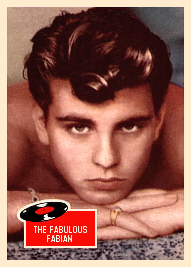
While a handful of Chancellor singles failed to make the grade between late '60 and late '61, he starred with Tommy Sands in Paramount's Love in a Goldfish Bowl and made an impression on TV in A Lion Walks Among Us (a December 1961 episode of ABC-TV's short-lived anthology series Bus Stop), an early work by acclaimed director Robert Altman. Fabian went out of his comfort zone a bit and delivered what is considered his best performance as a swaggering, homicidal drifter. As confidence in his acting ability increased, the recording career came closer to an end. 1962 was cinematically eventful, with film roles in Mr. Hobbs Takes a Vacation and Irwin Allen's production of the Jules Verne novel Five Weeks in a Balloon, in addition to another dramatic TV role (Run Till it's Dark, an October episode of The Dick Powell Show that reteamed him with actress Weld). Next, he shared screen time with fellow singing idols Sands, Avalon and Sal Mineo and many (over one hundred!) other (mostly-male) stars in the epic, Oscar-winning war movie The Longest Day, the most successful of his projects with total receipts of more than 12 million dollars in 1963, the second-highest of any film that year.
Just prior to this, he'd made an attempt at continuing as a singer with "Break Down and Cry," an interesting talking/singing number for Dot Records. Lack of interest in the track forced a decision. A report in Billboard declared he was "down to his last $100,000" and was seeking a new manager; still only 19 and unable to obtain more than a fraction of that amount until the age of 21, he decided to abandon his music career in favor of acting. Plenty of television work came his way with guest spots on The Virginian, Wagon Train, The Eleventh Hour and other series, many of them westerns. In 1964 he took a role in Columbia Pictures' Ride the Wild Surf (well-known for its hit theme by Jan and Dean), starring with other hitmaking actor-singers Tab Hunter and Shelley Fabares). This was followed by a comedy, Dear Brigitte with James Stewart, and a British mystery drama, Ten Little Indians.
After signing a contract with American International in 1965, Fabian starred in seven low budget, big-screen productions over the next five years, starting with Fireball 500, an auto-racing film that also featured beach movie stars Avalon and Annette Funicello. A series of tacky, youth-appeal/drive-in fare (mad-scientist-and-robots comedy Dr. Goldfoot and the Girl Bombs with Vincent Price, fast-car guilty pleasures Thunder Alley and The Wild Racers, drug drama Maryjane and crime flick The Devil's 8) kept him busy the rest of the decade. His final stint with AIP in 1970, as depression era bank robber Charles "Pretty Boy" Floyd in A Bullet for Pretty Boy, contains one of his better performances yet was his last notable theatrical role. Afterwards, he showed up from time to time in TV movies (Getting Married, 1978, Crisis in Mid-Air, 1979) and guest roles (portraying himself, circa '59, on an episode of Laverne and Shirley in 1977 and a 1982 installment of The Love Boat with music biz peers Annette, Edd Byrnes and Bobby Sherman).
Producers and casting directors kept Fabian within his range as an actor. As a result, he was never really bad and sometimes very good. His presence onscreen would never place him on any sort of awards radar...with one exception. He became involved in television producing, resulting in a 1993 Emmy nomination in the category Outstanding Informational Series for The Wild West, specifically the episode Cowboys. By that time he had returned to his first profession, joining Avalon and Rydell (and occasionally Chubby Checker) in a long-running series of concerts as "The Golden Boys," performing at casinos and music festivals from the 1980s right up through recent years. Fabian Forte can claim the better part of six decades as an entertainer and there was never a need to be concerned about what the critics thought. They're outnumbered by the fans. His is a success story that outpaced many of his rock and roll contemporaries.
NOTABLE SINGLES:
- I'm in Love - 1958
- Be My Steady Date - 1958
- I'm a Man - 1959
- Turn Me Loose - 1959
- Tiger - 1959
- Come on and Get Me /
Got the Feeling - 1959 - Hound Dog Man /
This Friendly World - 1959 - String Along /
About This Thing Called Love - 1960 - I'm Gonna Sit Right Down and Write Myself a Letter /
Strollin' in the Springtime - 1960 - King of Love - 1960
- Kissin' and Twistin' - 1960
- You Know You Belong to Somebody Else - 1961
- The Love That I'm Giving to You - 1961
- Wild Party - 1961
- Break Down and Cry - 1962


